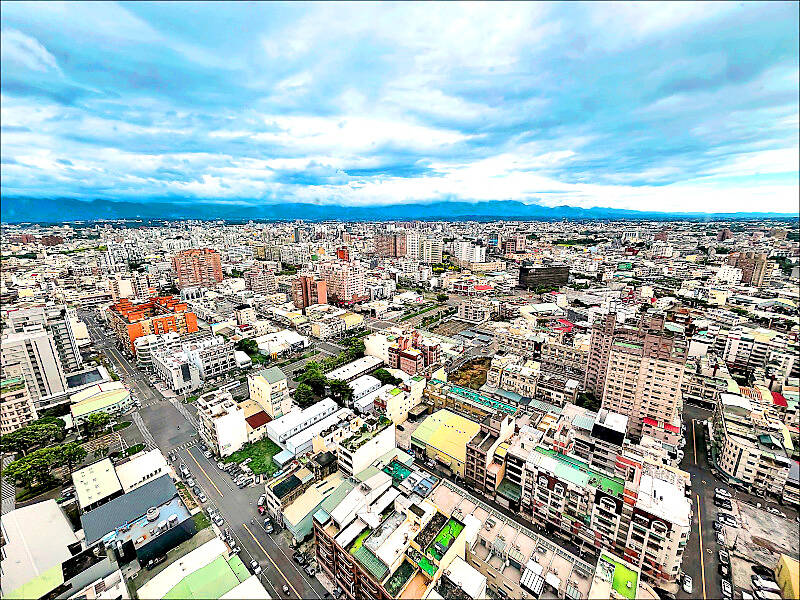The large number of old buildings in Taipei is making it more challenging to address the city’s rapidly aging population, a housing researcher said.
As of June, 11 of Taipei’s 12 districts were “super-aged,” meaning that at least 20 percent of their populations were aged 65 or older, housing researcher Ho Shih-chang (何世昌) said on Saturday, citing Ministry of the Interior data.
Seventy-three percent of the city’s buildings are at least 30 years old, he added.

Photo: Taipei Times
“For every 1.37 homes in the city there is one home that was built before the 921 Earthquake in 1999,” he said.
Of the 368 administrative regions and districts nationwide, 191 — 51.9 percent of the total — are super-aged, he said.
While the aging population is a nationwide problem, the situation is particularly pronounced in Taipei, where 90 percent of districts are super-aged and half of the homes are more than 40 years old, he said.
As many as 18 percent of the city’s homes are 50 years old or older, and that number is growing, as urban renewal efforts fail to keep pace, Ho said.
“With housing prices so high, some buyers favor older buildings, which offer more space at lower prices,” he said. “Their mindset is that even though the buildings are 40 or 50 years old, they can live there and wait for the building to be replaced under an urban renewal project.”
Ministry data showed that of the 4,435 property sales and transfers in Taipei in the second quarter of this year, 2,829 were in buildings that were older than 30 years old, accounting for 63.79 percent of the total.
Of those 2,829 properties, 2,211 were more than 40 years old, accounting for nearly 78 percent of the aging properties sold, Ho said.
“One out of every 1.56 residential transfers in Taipei is an old property. Only 91 properties sold in the past five years were new, accounting for about 2.05 percent of the total,” he said. “That means that only one out of every 48.78 property transfers in Taipei is a new property.”
A building built before 1999 — when new construction standards were introduced to improve their earthquake resilience — is not necessarily dangerous to live in, Sinyi Realty Inc (信義房屋) research manager Tseng Ching-der (曾敬德) said.
“However, buildings constructed after that date follow stricter standards,” he said.
Andy Huang (黃舒衛), director of Landlord Representation Services at Colliers International Taiwan, said the situation is in a downward spiral, with older buildings decreasing in value as the financial capacity of elderly people declines as they get older, he said.
“Outside assistance is needed to balance the quality of life and financial situation of older people, especially amid this housing market,” he said. “Otherwise, social risks would worsen.”
To address the housing crisis faced by older people, Huang recommended integrating policies and resources, while accelerating the institutional reform of the rental market and social housing.

The Central Election Commission has amended election and recall regulations to require elected office candidates to provide proof that they have no Chinese citizenship, a Cabinet report said. The commission on Oct. 29 last year revised the Measures for the Permission of Family-based Residence, Long-term Residence and Settlement of People from the Mainland Area in the Taiwan Area (大陸地區人民在台灣地區依親居留長期居留或定居許可辦法), the Executive Yuan said in a report it submitted to the legislature for review. The revision requires Chinese citizens applying for permanent residency to submit notarial documents showing that they have lost their Chinese household record and have renounced — or have never

A magnitude 5.6 earthquake struck off the coast of Yilan County at 12:37pm today, with clear shaking felt across much of northern Taiwan. There were no immediate reports of damage. The epicenter of the quake was 16.9km east-southeast of Yilan County Hall offshore at a depth of 66.8km, Central Weather Administration (CWA) data showed. The maximum intensity registered at a 4 in Yilan County’s Nanao Township (南澳) on Taiwan’s seven-tier scale. Other parts of Yilan, as well as certain areas of Hualien County, Taipei, New Taipei City, Taoyuan, Hsinchu County, Taichung and Miaoli County, recorded intensities of 3. Residents of Yilan County and Taipei received

Taiwan has secured another breakthrough in fruit exports, with jujubes, dragon fruit and lychees approved for shipment to the EU, the Ministry of Agriculture said yesterday. The Animal and Plant Health Inspection Agency on Thursday received formal notification of the approval from the EU, the ministry said, adding that the decision was expected to expand Taiwanese fruit producers’ access to high-end European markets. Taiwan exported 126 tonnes of lychees last year, valued at US$1.48 million, with Japan accounting for 102 tonnes. Other export destinations included New Zealand, Hong Kong, the US and Australia, ministry data showed. Jujube exports totaled 103 tonnes, valued at

BIG SPENDERS: Foreign investors bought the most Taiwan equities since 2005, signaling confidence that an AI boom would continue to benefit chipmakers Taiwan Semiconductor Manufacturing Co’s (TSMC, 台積電) market capitalization swelled to US$2 trillion for the first time following a 4.25 percent rally in its American depositary receipts (ADR) overnight, putting the world’s biggest contract chipmaker sixth on the list of the world’s biggest companies by market capitalization, just behind Amazon.com Inc. The site CompaniesMarketcap.com ranked TSMC ahead of Saudi Aramco and Meta Platforms Inc. The Taiwanese company’s ADRs on Tuesday surged to US$385.75 on the New York Stock Exchange, as strong demand for artificial intelligence (AI) applications led to chip supply constraints and boost revenue growth to record-breaking levels. Each TSMC ADR represents